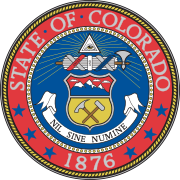A state legislature in the United States is the legislative body of any of the 50 U.S. states. The formal name varies from state to state. In 27 states, the legislature is simply called the Legislature, or the State Legislature, while in 19 states the legislature is called the General Assembly. In Massachusetts and New Hampshire, the legislature is called the General Court, while North Dakota and Oregon designate the legislature the Legislative Assembly.

In political science, an initiative is a means by which a petition signed by a certain minimum number of registered voters can force a government to choose to either enact a law or hold a public vote in parliament in what is called indirect initiative, or under direct initiative, the proposition is immediately put to a plebiscite or referendum, in what is called a Popular initiated Referendum or citizen-initiated referendum.

In California, a ballot proposition can be a referendum or an initiative measure that is submitted to the electorate for a direct decision or direct vote. If passed, it can alter one or more of the articles of the Constitution of California, one or more of the 29 California Codes, or another law in the California Statutes by clarifying current or adding statute(s) or removing current statute(s).
In the politics of the United States, the process of initiatives and referendums allow citizens of many U.S. states to place new legislation on a popular ballot, or to place legislation that has recently been passed by a legislature on a ballot for a popular vote. Initiatives and referendums, along with recall elections and popular primary elections, are signature reforms of the Progressive Era; they are written into several state constitutions, particularly in the West.
Defend Colorado Now (DCN) was a ballot initiative introduced in January 2006 to amend the constitution of Colorado to deny non-emergency public services that are not required by federal law to illegal immigrants in Colorado. It was similar to the recently approved Arizona Proposition 200 (2004), which denied public services to illegal aliens and California Proposition 187 (1994) which was declared unconstitutional by the Federal Appeals Court.
Amendment 44 was a proposed amendment to the state statutes submitted for referendum in the 2006 general elections in the U.S. state of Colorado. The amendment proposed the legalization of the possession of one ounce or less of marijuana for any person twenty-one years of age and over, as long as marijuana use does not occur in public. The measure was eventually defeated at the polls by 60-40 percent.

Amendment 41 is a citizen initiative adopted by Colorado voters in the 2006 general election. Amendment 41 has three main sections.

National initiative refers to a proposed process to petition an initiative at the federal level in the United States via a national vote on the national ballot measure. While some U.S. states allow direct or indirect initiatives, there are currently no national initiatives in the United States.

A ballot proposition in the state of Arizona refers to any legislation brought before the voters of the state for approval.

Electoral reform in Colorado refers to efforts to change the voting laws in the Centennial State.

Douglas Edward Bruce is an American conservative activist, former legislator in the U.S. state of Colorado and convicted felon.

Proposition 11 of 2008 was a law enacted by California voters that placed the power to draw electoral boundaries for State Assembly and State Senate districts in a Citizens Redistricting Commission, as opposed to the State Legislature. To do this the Act amended both the Constitution of California and the Government Code. The law was proposed by means of the initiative process and was put to voters as part of the November 4, 2008 state elections. In 2010, voters passed Proposition 20 which extended the Citizen Redistricting Commission's power to draw electoral boundaries to include U.S. House seats as well.

Amendment 46, also known as the "Colorado Civil Rights Initiative, was a proposed initiative on the Colorado ballot for 2008. If ratified, Article II of the Colorado Constitution would have stated:
The State shall not discriminate against, or grant preferential treatment to, any individual or group on the basis of race, sex, color, ethnicity, or national origin in the operation of public employment, public education, or public contracting.
Buckley v. American Constitutional Law Foundation, Inc., 525 U.S. 182 (1999), was a United States Supreme Court case that dealt with the authority of states to regulate the electoral process, and the point at which state regulations of the electoral process violate the First Amendment freedoms.
The history of direct democracy amongst non-Native Americans in the United States dates from the 1630s in the New England Colonies. Many New England towns still carry on that tradition in the form of open town meetings.

The Massachusetts "Right to Repair" Initiative, also known as Question 1, appeared on the Massachusetts 2012 general election ballot as an initiated state statute. The Right to Repair proposal was to require vehicle owners and independent repair facilities in Massachusetts to have access to the same vehicle diagnostic and repair information made available to the manufacturers' Massachusetts dealers and authorized repair facilities. The initiative passed with overwhelming voter support on November 6, 2012, with 86% for and 14% against. The measure, originally filed four times with the Massachusetts Attorney General, was filed by Arthur W. Kinsman, and was assigned initiative numbers 11-17.
RepresentUs is a nonpartisan, nonprofit organization founded in November 2012 that advocates for state and local laws based on model legislation called the American Anti-Corruption Act. It is a proposal to overhaul lobbying, transparency, and campaign finance laws. RepresentUs is headquartered in Florence, Massachusetts and is supported by a national network of volunteer-led chapters.

Cal 3 was a proposal to split the U.S. state of California into three states. It was launched in August 2017 by Silicon Valley venture capitalist Tim Draper, who led the effort to have it originally qualify on the November 2018 state ballot as Proposition 9 In July 2018, the Supreme Court of California pulled it from the ballot for further state constitutional review. Draper officially stopped pushing for the measure soon after. On 12 September 2018, the court permanently removed the measure from all future ballots.

The Fairness Project is a United States 501(c)(4) charitable organization created in October 2015. It exists to promote general economic and social justice throughout the US by use of ballot measures to circumvent deadlock in law changes by the legislative and executive branches of government. The Project acts as a national body, supporting state organizations and campaigns with targeted funding, rather than by direct campaigning. They support the gathering of signatures to meet the variable requirements to trigger ballots in states and then aid the campaigns with early financial backing, strategic advice, and various campaign tools.








